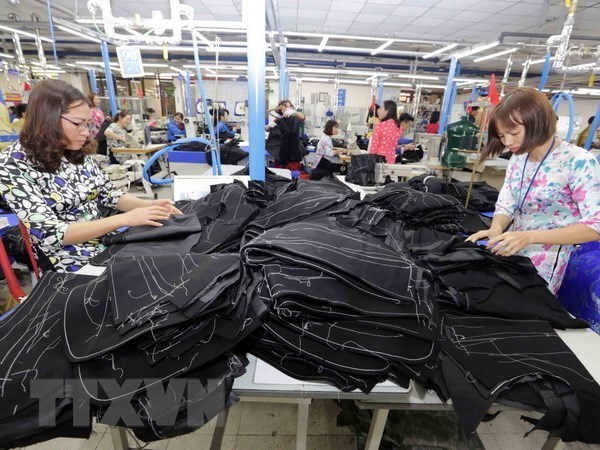
Vietnamese garment sector maintains growth in traditional markets
Vietnam Plus | 4 June 2018
Hanoi (VNA) –Many Vietnamese garment firms have maintained high growth in traditional markets this year, including the US, the Republic of Korea, the European Union and member states of the Comprehensive and Progressive Agreement for Trans-Pacific Partnership (CPTPP).
Vice President and General Secretary of the Vietnam Textile and Apparel Association (VITAS) Truong Van Cam said a series of recently-signed free trade agreements (FTAs) is expected to boost the sector.
Since 2001, Vietnam has signed bilateral trade agreements with the US, Japan, China, the Republic of Korea, Australia, New Zealand and India, and joined the World Trade Organisation.
However, global demand for textiles and apparels only grows by 1-2 percent each year, resulting in fierce competition, he said.
According to him, most FTAs have rules on product origin for fibre and fabrics while Vietnam imports up to 80 percent of materials.
At present, Bangladesh cuts corporate tax to 20 percent from 35 percent andlinen fiber and spandex import tax from 10 percent to 5 percent. Pakistan waives material and energy taxes for exported apparel while India reduces fibre import tax to 2.5 percent from 5 percent.
The EU offers zero percent tax to apparel from Cambodia and Myanmar while the US waives tax for several Cambodia goods. Vietnamese apparels are still subject to 17.7 percent and 9.6 percent tax when exporting to the US and the EU, respectively.
VITAS called on the State to devise planning and grant licences to major garment industrial areas to attract investment in weaving and dyeing.
It also urged supporting wastewater treatment in industrial zones and discouraging foreign firmsfrom investing in fiber and sewing.-VNA
Vice President and General Secretary of the Vietnam Textile and Apparel Association (VITAS) Truong Van Cam said a series of recently-signed free trade agreements (FTAs) is expected to boost the sector.
Since 2001, Vietnam has signed bilateral trade agreements with the US, Japan, China, the Republic of Korea, Australia, New Zealand and India, and joined the World Trade Organisation.
However, global demand for textiles and apparels only grows by 1-2 percent each year, resulting in fierce competition, he said.
According to him, most FTAs have rules on product origin for fibre and fabrics while Vietnam imports up to 80 percent of materials.
At present, Bangladesh cuts corporate tax to 20 percent from 35 percent andlinen fiber and spandex import tax from 10 percent to 5 percent. Pakistan waives material and energy taxes for exported apparel while India reduces fibre import tax to 2.5 percent from 5 percent.
The EU offers zero percent tax to apparel from Cambodia and Myanmar while the US waives tax for several Cambodia goods. Vietnamese apparels are still subject to 17.7 percent and 9.6 percent tax when exporting to the US and the EU, respectively.
VITAS called on the State to devise planning and grant licences to major garment industrial areas to attract investment in weaving and dyeing.
It also urged supporting wastewater treatment in industrial zones and discouraging foreign firmsfrom investing in fiber and sewing.-VNA


The EU offers zero percent tax to apparel from Cambodia and Myanmar while the US waives tax for several Cambodia goods. Vietnamese apparels are still subject to 17.7 percent and 9.6 percent tax when exporting to the US and the EU, respectively.
ReplyDelete--------------------
Vietnamese garment workers are superior over the Cambodian garment workers such that even with 17 percent tariff, Vietnamese garments are still gaining market share.
Cambodian garment workers are actually lazy. Once they got the minimum wage raised up high enough, they will try to do everything to avoid work, then draw the pay check. They would go to the bath room longer, or walk slowly in the factory. This is pure communism as promoted by CNRP when they demand higher minimum wage to get the garment workers to work for them.
Vietnamese workers work aggressively for pay raise and high bonus. Factories pay them with tet-bonus (new year bonus) or the workers will bail to a better factories. That's pure capitalism.